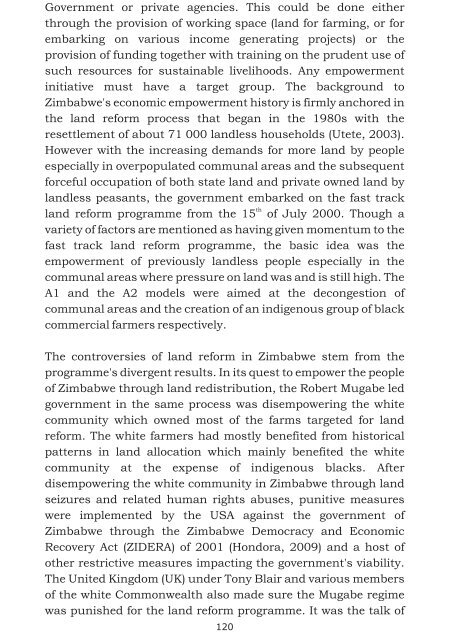Beneficiaries are actors too.pdf - Southern Institute of Peace ...
Beneficiaries are actors too.pdf - Southern Institute of Peace ...
Beneficiaries are actors too.pdf - Southern Institute of Peace ...
You also want an ePaper? Increase the reach of your titles
YUMPU automatically turns print PDFs into web optimized ePapers that Google loves.
Government or private agencies. This could be done either<br />
through the provision <strong>of</strong> working space (land for farming, or for<br />
embarking on various income generating projects) or the<br />
provision <strong>of</strong> funding together with training on the prudent use <strong>of</strong><br />
such resources for sustainable livelihoods. Any empowerment<br />
initiative must have a target group. The background to<br />
Zimbabwe's economic empowerment history is firmly anchored in<br />
the land reform process that began in the 1980s with the<br />
resettlement <strong>of</strong> about 71 000 landless households (Utete, 2003).<br />
However with the increasing demands for more land by people<br />
especially in overpopulated communal <strong>are</strong>as and the subsequent<br />
forceful occupation <strong>of</strong> both state land and private owned land by<br />
landless peasants, the government embarked on the fast track<br />
th<br />
land reform programme from the 15 <strong>of</strong> July 2000. Though a<br />
variety <strong>of</strong> f<strong>actors</strong> <strong>are</strong> mentioned as having given momentum to the<br />
fast track land reform programme, the basic idea was the<br />
empowerment <strong>of</strong> previously landless people especially in the<br />
communal <strong>are</strong>as where pressure on land was and is still high. The<br />
A1 and the A2 models were aimed at the decongestion <strong>of</strong><br />
communal <strong>are</strong>as and the creation <strong>of</strong> an indigenous group <strong>of</strong> black<br />
commercial farmers respectively.<br />
The controversies <strong>of</strong> land reform in Zimbabwe stem from the<br />
programme's divergent results. In its quest to empower the people<br />
<strong>of</strong> Zimbabwe through land redistribution, the Robert Mugabe led<br />
government in the same process was disempowering the white<br />
community which owned most <strong>of</strong> the farms targeted for land<br />
reform. The white farmers had mostly benefited from historical<br />
patterns in land allocation which mainly benefited the white<br />
community at the expense <strong>of</strong> indigenous blacks. After<br />
disempowering the white community in Zimbabwe through land<br />
seizures and related human rights abuses, punitive measures<br />
were implemented by the USA against the government <strong>of</strong><br />
Zimbabwe through the Zimbabwe Democracy and Economic<br />
Recovery Act (ZIDERA) <strong>of</strong> 2001 (Hondora, 2009) and a host <strong>of</strong><br />
other restrictive measures impacting the government's viability.<br />
The United Kingdom (UK) under Tony Blair and various members<br />
<strong>of</strong> the white Commonwealth also made sure the Mugabe regime<br />
was punished for the land reform programme. It was the talk <strong>of</strong><br />
120


